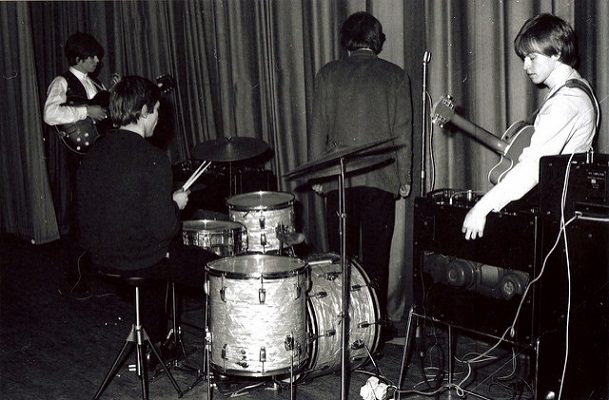
In 1969, the Rolling Stones released a seminal album, “Let it Bleed”—a sort of coda to the 1960s, and the generation that the decade spawned. The album is punctuated by themes of violence, disillusionment, protest, and sex, and marked the end of a decade that was characterized by those same issues. Music, as a textual artifact, can tell us a lot about the way that politics is experienced—and, international relations theory can benefit from a close engagement with music-as-text. I argue that “Let it Bleed,” in particular, raises significant theoretical and historical questions about the rise and decline of violence, as well as the ways that scholars of global politics engage with popular culture in their own analyses.
Steven Pinker, in his monumental work, The Better Angels of Nature, examines the way that “global civilizing processes” have resulted in the decline of violence worldwide. Pinker argues that this began in Europe: “As Europe became more urban, cosmopolitan, commercial, industrialized, and secular, it got safer and safer” (p. 64). This historical narrative of civilizing processes (pace sociologist Norbert Elias) causing the decline of violence is not limited to Pinker’s work, and has become a significant line-of-thought in liberal international relations theory. John Mueller argues that new understandings about the grotesqueness of war led to a decline in violence after World War I, and Andrew Linklater—in focusing on cosmopolitan harm conventions—argues that civilizing processes associated with an emerging human rights culture—have led to the decline of violence.
The problem with these arguments is that in such a sweeping understanding of history as a civilizing process, exceptions to the rule are understood as regressions—or “decivilizing processes.” For Pinker, the counterculture of the 1960s was an exception to this historical trajectory, with the rise of protest violence, the glorification of murder and assault, and the equation of brutality with the “outlaw” rock-n-roller (p. 113). In addressing the Stones’ “Let it Bleed,” Pinker makes an example of the album as proof of the decivilization brought about by the atmosphere of the 1960s. In fact, in citing the song “Midnight Rambler” from the album, Pinker calls the work an example of the “celebration” of violence by the rock-n-roll generation. “Midnight Rambler,” a song about the Boston Strangler, which acts out the rape and murder of one of his victims, represents—for Pinker—such a disintegration of the sweeping narrative he presents about the decline of violence. Clearly, the Rolling Stones were an example of this glorification of violence by the young generation of the 1960s.
However, this usage of text in such a way as to fit a clear narrative of civilizing processes punctuated by brief regressions, distorts not only “Let it Bleed” and its component parts, but it also distorts the ways in which the history of global violence is not just about statistical trends, but also the ways in which violence is interpreted by its victims and its observers. If “decivilizing processes” are a part of this narrative, “Let it Bleed” does not represent such processes.
“Midnight Rambler,” in the context of the broader work of the album, is not a push against the civilizing process, but a reflection on the promises made to the 1960s generation. Rather than being a glorification of violence, it is a satire exposing the broken promises of a post-war West. The first song on the album, “Gimme Shelter,” emphasizes the contrast between the violence of Vietnam (“rape, murder, it’s just a shot away”), with the message of love that the 1960s represented (“I tell you, love, sister, it’s just a kiss away”). Ending the album with “You Can’t Always Get What You Want,” is a telling finale to an album that describes the failures of the 1960s, suggesting the idea that love could save us might have been naïve. After all, that idealism cannot be reconciled with the generation that brought to life someone like Albert DeSalvo, who murdered thirteen women in Boston between 1962 and 1963.
What international relations scholars can take from such artifacts as “Let it Bleed” is that music as a type of text is not simply data for a theory of sweeping metahistory like Pinker’s. Music can reveal political experiences of violence in depths that such histories cannot adequately account for. As my own research on the history of military intervention shows, such narratives about the “decline of violence” often overlook the ways in which other forms of violence rupture these narratives. “Let it Bleed” reveals these violences, and the impact they had on the generation it reflected upon.
Cosmopolitanism and global changes in our understandings of human rights and dignity were not challenged by “decivilizing processes” alleged to counterculture figures as the Rolling Stones. Rather, their eulogy to the 1960s left open what those dashed promises meant to their contemporaries. On “Midnight Rambler,” Keith Richards notes: “A lot of people still complain that they can’t hear the voice properly. If the words come through it’s fine, if they don’t, that’s all right too because anyway they can mean a thousand different things to anybody.”
Instead of fitting texts like “Let it Bleed” into grand historical narratives, it’s time we recognized such texts as mosaics that challenge such narratives, and instead represent deep reflections on the contexts, contradictions, and interpretation of cruelty and violence. A more sustained engagement with aesthetics in this way would open up new avenues in the study of world politics from the perspectives of those who live it.
Further Reading on E-International Relations
- Punk AF: Resisting Postmodern Interpretations of Punk Culture in World Politics
- Animal Suffering and the Civilizing Process
- Towards an Atlantic World Order: Fundamental Transformation and Learning Processes in the Long Twentieth Century
- AI Enabled Decisions: Processes Not Binaries
- Opinion – Luigi Mangione and the Politics of Violence Labelling
- Opinion – The Gendered Face of Violence and Erasure in Kashmir